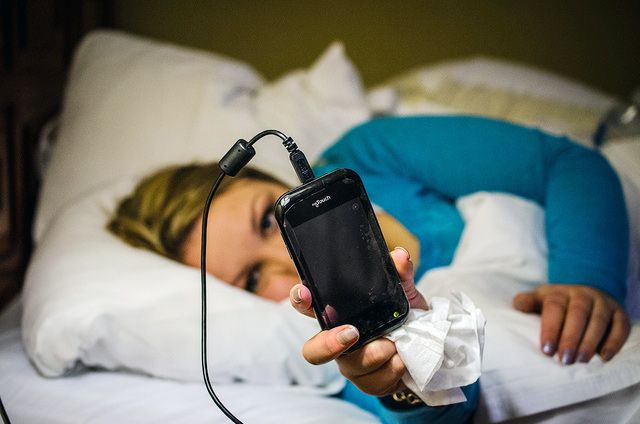When the human body is exposed to too much artificial light at night, the body's biological clock gets confused and this natural sleep pattern starts disrupting.

When we talk about the ills of smart-phone addiction, we usually refer to visual fatigue, sedentary lifestyles and a low-on-human-interaction society as the probable negative outcomes.
However, do you know that excessive addiction to smart-phones and the chats and e-reading sessions that keep you plugged right up to your bed time might be eating up into your sleep?
Dr K Bhujang Shetty, chairman and managing director at Narayana Nethralaya, Bangalore, shared that 18-year-old Asmita Mittal always used to have some type of smart-phone or digital device in front of her most of her waking time.
This seems a common behavioural pattern today for teenagers and even adults who are glued to their devices most of the time. But for Asmita, it had actually turned into an addiction. She initially displayed symptoms of acute attention deficit disorder and later also started experiencing sleeplessness.
This is when her parents checked with a doctor who advised them to institute a no-phone-to-bed rule for the family.
Constant exposure to the screens of digital devices doesn't just cause digital fatigue to the eyes, it also exposes them to Blue Light.
Further speaking about Blue Light, the doctor said it to be the visible light that has components of several colours corresponding to different wavelengths. Most of us memorised the different colour components of light at school by learning the acronym VIBGYOR.
Blue light is the 'B' in VIBGYOR or the band of visible light that is blue in colour and corresponds to a wavelength of between 380 nm and 500 nm. This is hence one of the shortest, highest-frequency and highest energy wavelengths.
While solar radiation is considered to have 25 percent to 30 percent blue light, the cumulative effect of exposure to multiple digital devices exposes us to significantly higher amount of blue light. Add to the fact that modern light sources such as LEDs and CFLs are also significant emitters of blue light, our exposure to blue light in our daily lives is quite high today.
Our body's natural biological clock also known as the circadian rhythm is responsible for keeping our sleep patterns in place.
It is our brain which decides when we sleep and when we wake up. When the body is exposed to the natural sunlight (and to the darkness after sundown), the brain (specifically the hypothalamus of the brain) sets our body clock. It is naturally tuned into sleep mode when it is dark and tuned out of sleep mode when it is light.
The day and night hormones in the body are triggered by this circadian rhythm. However, when the human body is exposed to too much artificial light at night, the body's biological clock gets confused and this natural sleep pattern starts disrupting. This explain why the practice of putting the light off before bed does more than just serve the aesthetic purpose; it induces the brain towards sleep.
More specifically it is Blue Light radiation that interferes with the natural biological clock of the body. So the blue wavelength which boosts attention span, alacrity and mood during the day to keep us alert and active, becomes disruptive at night as it inhibits the body's natural rhythm and sleep hormones.
Blue Light hinders the production of the melatonin hormone that is produced by the body when the brain signals the time to sleep. It is understood that since Blue Light is a high energy band of light, its shorter wavelengths cause the body to produce less melatonin.
In fact, a study has also highlighted that people who spend too much time reading from light emitting devices also had reduced duration of sleep and less REM sleep (the deep phase of sleep when we dream) as compared to people who read printed books.
Research suggests that the disruption of this circadian rhythm can have serious consequences on the body's health and increase our risk of cardiovascular disease and diabetes, among others. Not to talk about the physically unappealing phenomenon of being wide awake at night and lethargic as a consequence in the morning.
While it is not practically possible to eliminate all Blue Light from our daily lives, efforts can (and should) be made to limit our body's exposure to it as much as possible to allow your body produce melatonin and get adequate amount and good quality of sleep.
- Make it a rule to remove and stop using all digital devices at least 30 minutes before bed time to keep blue light off the body. This means no smartphone, no television, no tablets and no e-readers on the bed.
- Turn off LED and CFL light sources an hour before bed time; turn to old-school sources of lighting before bed.
- Start using light shades to dim these lights.
- Wearing blue light filtering glasses can also help.











 © 2025
© 2025